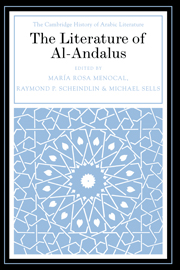Book contents
- Frontmatter
- 1 Visions of al-Andalus
- PART I THE SHAPES OF CULTURE
- PART II THE SHAPES OF LITERATURE
- PART III ANDALUSIANS
- 10 Ibn Ḥazm
- 11 Moses Ibn Ezra
- 12 Judah Halevi
- 13 Petrus Alfonsi
- 14 Ibn Quzmān
- 15 Ibn Zaydūn
- 16 Ibn Ṭufayl
- 17 Ibn ʿArabī
- 18 Ramon Llull
- 19 Ibn al-Khaṭīb
- PART IV TO SICILY
- PART V MARRIAGES AND EXILES
- PART VI TO AL-ANDALUS, WOULD SHE RETURN THE GREETING
- Index
- References
16 - Ibn Ṭufayl
from PART III - ANDALUSIANS
Published online by Cambridge University Press: 28 May 2012
- Frontmatter
- 1 Visions of al-Andalus
- PART I THE SHAPES OF CULTURE
- PART II THE SHAPES OF LITERATURE
- PART III ANDALUSIANS
- 10 Ibn Ḥazm
- 11 Moses Ibn Ezra
- 12 Judah Halevi
- 13 Petrus Alfonsi
- 14 Ibn Quzmān
- 15 Ibn Zaydūn
- 16 Ibn Ṭufayl
- 17 Ibn ʿArabī
- 18 Ramon Llull
- 19 Ibn al-Khaṭīb
- PART IV TO SICILY
- PART V MARRIAGES AND EXILES
- PART VI TO AL-ANDALUS, WOULD SHE RETURN THE GREETING
- Index
- References
Summary
Abū Bakr ibn Ṭufayl (d. 1185/6) was born in Guadix, northeast of Granada, in the early twelfth century. He was trained in medicine and studied philosophy in the tradition of the iconoclastic Muslim thinker Ibn Bājja, although he never met this founding figure of Andalusian philosophy. His work as a physician placed him in court circles, and he became secretary to the governor of Granada and then to the governor of Ceuta and Tangier, a son of ʿAbd al-Mutammim, who had been the lieutenant and chief military commander of Ibn Tūmart, the founder of the Almohad dynasty. Ibn Ṭufayl became court physician to the Almohad sultan Abū Yaʿqūb Yūsuf (r. 1163–84) and may have served as a qadi under Abū Yaʿqūb’s regime. The ruler was a lover of learning who gathered books in unprecedented numbers from all parts of his dominions and sought out scholars and thinkers as ornaments to his court. He genuinely enjoyed the philosopher’s company, and they spent hours, sometimes days, together in conversation. Ibn Ṭufayl is even named in one source as a vizier, or chief minister. He probably did not hold that rank, but his influence with the sultan was immense.
- Type
- Chapter
- Information
- The Literature of Al-Andalus , pp. 318 - 330Publisher: Cambridge University PressPrint publication year: 2000



